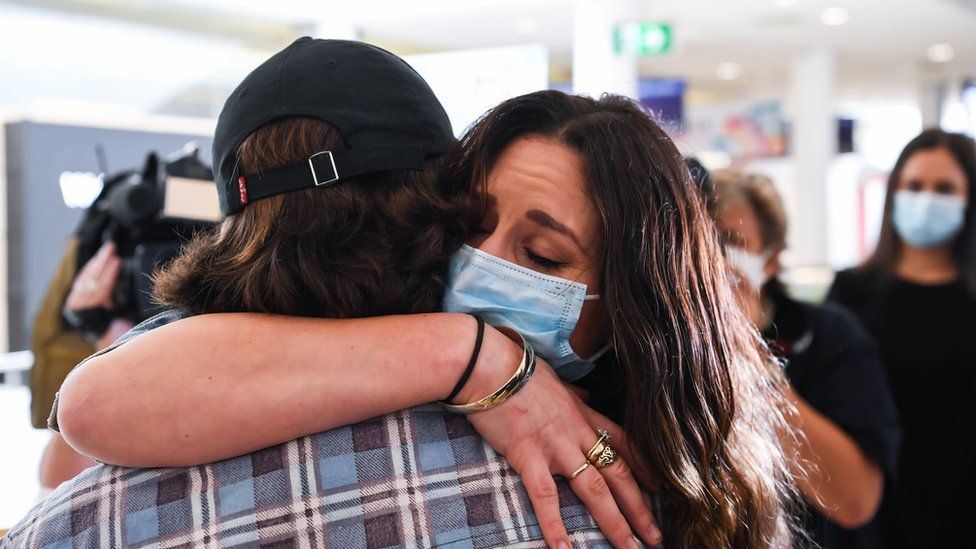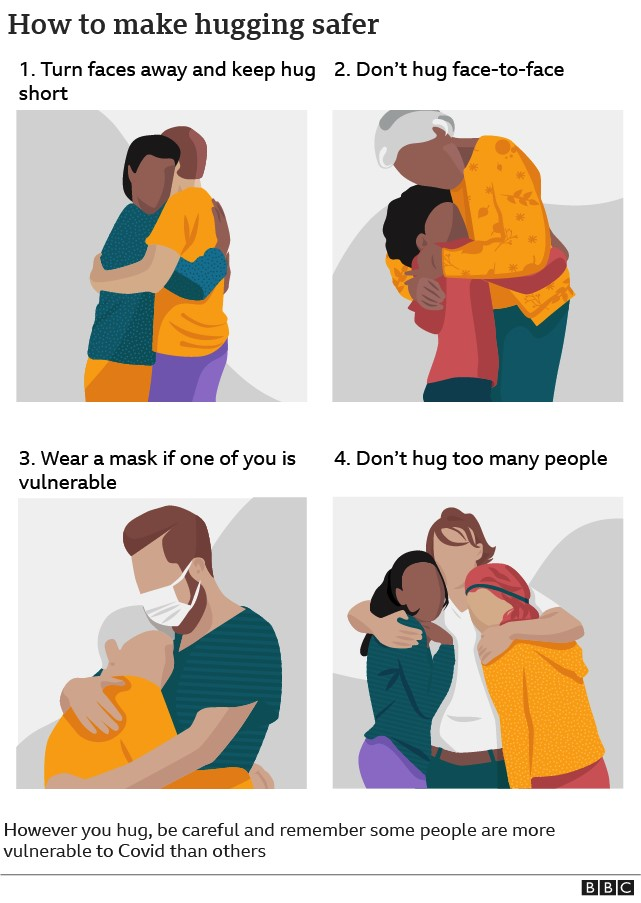Millions of people will be able to hug loved ones again from Monday. But can you minimise the risk?

image copyrightJames D. Morgan
The rules on hugs are changing. From Monday, close physical contact with people from other households is allowed in England and Scotland – and for millions of people this will be the first time they’ve hugged family and friends in months.
Experts say there are real benefits to hugging – it lowers stress and blood pressure – but the government is urging people to be cautious. So how can you give a cautious hug? We’ve gathered advice from coronavirus experts on how to hug safely.
“Personally I’m going to restrict my hugging to family members and not beyond,” says Prof Sally Jane Cutler from the University of East London. “I think we have to be very conserved about who we choose to hug.”
Prof Cath Noakes – who sits on the Sage committee that advises the government – adds that the risk will depend on who you’re hugging. “It would worry me if we were advocating we could hug all of our friends every time we meet them again.
“Perhaps don’t hug everybody you know. If you are going to hug somebody, restrict it to very small numbers of close family who perhaps you would really value a hug from.”
Frank Atherton, the chief medical officer in Wales – where some families and friends can already cwtch (cuddle) if they form an extended household – also urges against hugging every Tom, Dick and Harry.
“Prevalence rates are really quite low at the moment, and being close to a member of your family is less risk now,” he says. “But with strangers, I would be very cautious still.”
The government’s new advice suggests people should take extra care with those vulnerable to Covid, and maybe choose not to hug elderly relatives – especially if either hugger is not vaccinated.

The length of time you spend in close contact with someone also makes a difference. “Don’t spend too long making face-to-face contact, make it a brief hug,” Dr Atherton says.
Prof Noakes agrees: “Don’t hug too frequently, keep it short.”
The government’s own updated advice on hugging also makes this point. “Longer periods of close contact increase the risk of transmission, but remember that even brief contact can spread Covid-19 – and there is no such thing as a fully safe period of close contact,” it says.
“Try and avoid being face to face, so perhaps if you turn your face away slightly, and even wearing a mask could help,” Prof Noakes says.
“The reality is that when you hug someone you are very close to them and we know the virus is in people’s breath and you are very close to that breath at that moment.”
“The other thing – which sounds really miserly – but there is the option of wearing a face covering while hugging,” says Prof Linda Bauld from the University of Edinburgh.
“If you were visiting a vulnerable person in general, you would want to do that. Hand hygiene is still really important as well. When you touch someone, you are touching things they have touched.”
Experts have always been clear that the risks from Covid are lower outside. The government advice on close contact also suggests hugging loved ones outside is safer.
If people are meeting inside – as is allowed in groups of up to six from 17 May – then make sure the space is well ventilated, it adds.
“Open windows and doors, or take other action to let in plenty of fresh air. The more fresh air that is brought inside, the quicker any airborne virus will be removed from the room.”
The government suggests that to make close contact safer, people should test themselves regularly – even if they don’t have symptoms.
“Around one in three people with coronavirus do not show symptoms, so can spread the virus to others without knowing,” the government says. “Testing regularly will help to reduce risk.”
Not everyone may be excited for the return of hugs next week – but according to science, it’s good for you.
Touch is “really fundamental” for humans, says Prof Robin Dunbar, evolutionary psychologist at the University of Oxford – and going without it weakens our close relationships.
“The sort of more intimate touching – arm round the shoulder, a pat on the arm and these kind of things reserved for closer friendships and family members – are really important,” he says. They make us feel happier, satisfied and trusting of others.
Touch is our first sense to develop in the womb, and research has shown physical contact with others can reduce the effect of stress.
Prof Linda Bauld says there are scientifically-proven benefits to touch and “particularly a warm embrace”. “We know from studies that it lowers heart rate, blood pressure and reduces stress,” she says.
Prof Dunbar says the reason humans need physical contact is because we evolved from primates who groom each other.
Although most of our fur has gone, humans do the same movements on exactly the same neurons when they stroke, cuddle or pat each other, he says. This triggers endorphins, the feel-good chemicals in the brain.




Do you have plans to hug a loved one on Monday? Email haveyoursay@bbc.co.uk.
Please include a contact number if you are willing to speak to a BBC journalist. You can also get in touch in the following ways:
If you are reading this page and can’t see the form you will need to visit the mobile version of the BBC website to submit your question or comment or you can email us at HaveYourSay@bbc.co.uk. Please include your name, age and location with any submission.
The BBC is not responsible for the content of external sites.